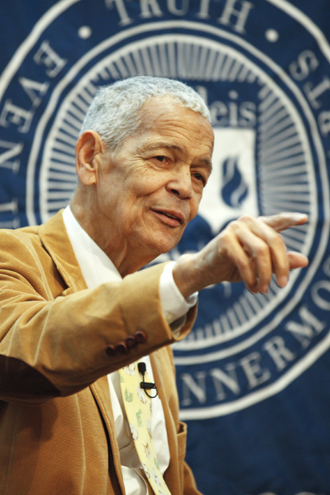2015 Richman Fellow Julian Bond visits campus
The civil rights leader presents keynote address, meets with students in a series of campus events
 Photo/Mike Lovett
Photo/Mike LovettJulian Bond speaks during a ceremony recognizing his Richman Fellowship.
Julian Bond went into the segregated cafeteria of Atlanta’s city hall with a group of fellow college students in 1960 and when he was refused service, he refused to leave. It was the first time he was arrested and brought before a judge.
“After some back and forth, the judge asked me, 'How do you plead?' And I was panic-stricken,” Bond recalled. “On the one hand, I knew I was guilty – a policeman had asked me to leave and I had refused. But I didn’t feel guilty – I knew I had a right to eat in that tax supported cafeteria, and that any law that said I couldn’t was no law at all.”
The civil rights leader received a standing ovation upon being recognized as the 2014-15 Richman Fellow in a ceremony and speech March 31 at Rapaporte Treasure Hall. He was presented with the certificate by Brandeis University President Frederick M. Lawrence after being introduced by Associate Professor of African & Afro-American Studies Chad Williams.
"Very few individuals in the recent history of this country have, in the spirit of this award, worked towards improving American society, strengthening its democratic institutions, advancing social justice and increasing opportunities for all citizens more than Mr. Julian Bond," Williams said.
Bond was a co-founder of the Student Non-violent Coordinating Committee, which helped organize sit-ins like the one at Atlanta’s city hall, along with many other initiatives and forms of protest during the civil rights movement. Bond’s journey in the civil rights movement took him from protests in Birmingham to the March on Washington, the Freedom Rides of 1964, the March on Washington and Selma, Alabama in 1965.
He began a career in politics in 1965, when he was elected to the House of Representatives in Georgia. He led an alternate delegation to the Democratic National Convention in Chicago in 1968, where he became the first African-American to receive a nomination for vice president. He withdrew his candidacy because he was only 28 years old – seven years too young to serve as vice president.
Bond left politics in 1987 and became a college professor. But he has remained active in political protest – he was arrested outside the White House during a protest against the Keystone XL oil pipeline in 2013 – and has been an outspoken advocate for human rights for all, including LGBT people.
“That many had to struggle to gain these rights makes them precious. It doesn’t make them special, and it does not preserve them only for me or restrict them from others,” Bond said. “When others gain these rights, my rights are not diminished in any way. My rights are not diluted when my neighbor enjoys protection from discrimination. He or she becomes my ally in protecting the rights we all share.”
The Richman Fellowship honors individuals active in public life whose contributions have had a significant impact on improving American society, strengthening democratic institutions, advancing social justice or increasing opportunities for all citizens. The program is hosted by the International Center for Ethics, Justice and Public Life on behalf of the Office of the President. The fellowship was created by Brandeis alumna Dr. Carol Richman Saivetz '69, along with her children, Michael Saivetz '97 and Aliza Saivetz Glasser '01, in honor of Carol's parents, Fred and Rita Richman.
"With its emphasis on service to the nation and social justice, the fellowship reflects and extends the deeply held values of the Brandeis University community," said Daniel Terris, director of the International Center for Ethics, Justice and Public Life.
Bond’s visit to campus spanned three days, from March 31 to April 2. He visited with students and the Brandeis community in events around campus, including a screening of "Klansville, U.S.A.," an American Experience PBS documentary based on a book by Professor of Sociology David Cunningham, which was followed by a panel discussion with filmmaker Callie Wiser, Cunningham and Bond, moderated by Associate Professor of Politics Daniel Thomas Kryder, and a panel discussion on social movements, legislation and public policy with Bond, Williams and Maya Cooper '15, which was moderated by Heller School PhD candidate Sarah Gray.
Video of Bond’s lecture and an interview with Heller School lecturer Phillip Martin will be available on the Richman fellowship website.
Categories: Alumni, Humanities and Social Sciences, Student Life





